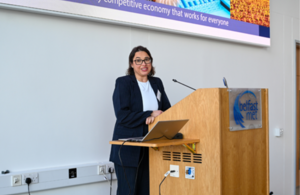Professor Ana Manzano – UKRI Policy Fellowship
Ana Manzano’s UKRI fellowship co-produced evaluation strategy, built partnerships, and delivered real-world impact in Northern Ireland’s government.

Professor Ana Manzano, UKRI Policy Fellow, Northern Ireland
Professor Ana Manzano from the University of Leeds undertook an 18-month UKRI Policy Fellowship with the Department for the Economy in Northern Ireland, where she co-produced a comprehensive monitoring and evaluation strategy tailored to departmental needs.
Tailoring evaluation for real-world impact
Professor Ana Manzano was based in the Department for the Economy in Northern Ireland where she co-produced a comprehensive monitoring and evaluation strategy, shaped around the department’s needs and her expertise in complex policy evaluation.
“The fellowship was structured to be collaborative from the start. We spent the first few months co-producing the scope of the work, making sure it was feasible and meaningful for both sides.”
Her work included capacity-building, training and identifying evaluation needs across a large department. The strategy she helped to develop was agreed by the Department, giving it a clear framework for evaluating programmes.
Working in a Devolved Administration
Ana’s placement offered a unique perspective on policymaking in a devolved context. She found the Department to be welcoming and enthusiastic about an academic joining their team and she described her placement in Northern Ireland as “the best decision.”
She found there was a strong appetite for partnership, that academic input was highly valued and she felt “respected and trusted from day one.” The experience also deepened her understanding of political and administrative complexities unique to Northern Ireland: “It gave me a real insight into how the Civil Service keeps things moving even during political shifts.”
Navigating Pace, Language, and Logistics
Ana adapted to the fast-changing pace of government, noting that work could “move very fast, then suddenly slow down,” which required flexibility. Her interdisciplinary background helped bridge differences in communication styles between academia and government, and she approached unfamiliar situations with curiosity rather than hesitation, saying, “when I didn’t understand something, I just asked – it wasn’t a barrier, it was part of the learning.”
Hybrid working and travel logistics were also part of the experience. Flying between Leeds and Belfast, Ana appreciated the Department’s flexibility, describing their support as “incredibly accommodating,” which, as a working parent, she felt made the fellowship more inclusive.
Lasting Impact
Ana’s fellowship had a direct impact on her career – she was promoted to Professor during the placement, with the fellowship contributing to her case for societal impact.
“It helped me demonstrate real-world outcomes. The strategy has my name on it, and it’s something tangible I can point to.”
The experience also helped her build lasting relationships with the Department and gave her greater understanding of how evaluation works in government – not just in theory, but in practice. These insights, she explained, will shape her future research for years to come.
Advice for academics
Ana encourages academics to consider placements as a valuable opportunity to “refresh your perspective.” She also urges academics to not overlook Devolved Governments as “they offer real opportunities to make a difference.”